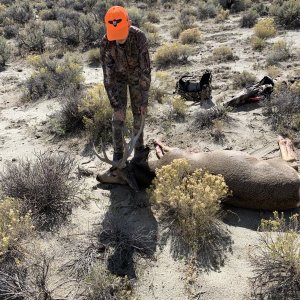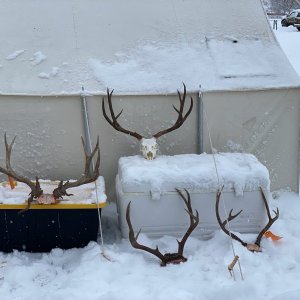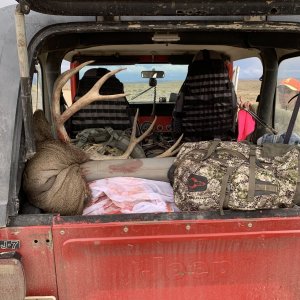FOR IMMEDIATE RELEASE CONTACT: Mark Eddington, (801) 375-7881
Heather Barney, (801) 524-4380
May 25, 2011
Barrasso, Hatch Introduce Bill to Curb Environmental Extremists? Excessive Lawsuits against Federal Government, Taxpayers
WASHINGTON ? Sens. John Barrasso (R-Wyo.), Orrin Hatch (R-Utah) and other members of the Senate Western Caucus today introduced a bill aimed at clamping down on the excessive lawsuits being filed by environmental extremists against the federal government that are costing U.S. taxpayers millions of dollars.
The Government Litigation Savings Act (GLSA) would reform the Equal Access to Justice Act (EAJA), which environmental extremist groups are systematically abusing to halt the work of land management and other federal agencies to use taxpayer money to fund their nonstop litigation and further their own narrow political agenda.
?These environmental groups have sued the federal government more than 1,200 times and collected more than $35 million from taxpayers. That has got to stop,? Hatch said. ?Our nation must not allow and cannot afford to let extremists hijack our laws and hold the American people hostage to their radical views. This legislation will help put a stop to the abuses of these deep-pocketed environmental groups, bring greater reporting and accountability to the process and lessen taxpayers? burden to pay for the attorney fees incurred by these lawsuits.?
As adopted by Congress in 1980, the EAJA was aimed at removing a barrier to justice by helping individuals, small businesses and nonprofit organizations recoup the money and other resources they spent in suing the federal government. For the past 15 years, Hatch noted, Congress and federal agencies have stopped tracking and reporting payments paid through the law, meaning there has been almost no accountability and oversight. As a result, the law has been subverted by a cadre of environmental groups to create a cottage industry of taxpayer-funded litigation.
If passed, the GLSA would change that by:
Requiring EAJA filers must show a ?direct and personal monetary interest? in the action;
Removing the $7 million net worth eligibility exemptions granted to nonprofits organizations and Agriculture Cooperatives;
Establishing a cap of $175 per hour for attorney?s fees, pegged to inflation; all additional multipliers are removed;
Requiring an agency to disallow EAJA reimbursements if the claimant unreasonably protracted the proceedings or acted in bad faith;
Capping total EAJA reimbursements to $200,000 for any single action, and allowing no more than 3 EAJA awards in a calendar year;
Establishing reporting requirements government-wide, and consolidating reporting into the Administrative Conference of the United States (ACUS); the report must include an explanation from the agency explaining why its position was not substantially justified;
Establishing an online, searchable database for funds paid out of EAJA and requiring that funds paid from EAJA in sealed settlement agreements must be included in the online report;
Requiring judges to disallow EAJA payments if the claimant unreasonably protracted the final resolution of the matter in controversy, or acted or in bad faith;
Requiring that as part of the annual report of payments under EAJA, the Attorney General must also make available to information about payments made from the Judgment Fund;
Ad Requiring the GAO to conduct an audit of EAJA payments over the past 15 years.
In addition to Hatch, co-sponsors include Sens. John Thune (R-S.D.), James Risch (R-Idaho), Mike Crapo (R-Idaho) and Dean Heller (R-Nev.). Members of the House Western Caucus have introduced a companion bill in the House.
Heather Barney, (801) 524-4380
May 25, 2011
Barrasso, Hatch Introduce Bill to Curb Environmental Extremists? Excessive Lawsuits against Federal Government, Taxpayers
WASHINGTON ? Sens. John Barrasso (R-Wyo.), Orrin Hatch (R-Utah) and other members of the Senate Western Caucus today introduced a bill aimed at clamping down on the excessive lawsuits being filed by environmental extremists against the federal government that are costing U.S. taxpayers millions of dollars.
The Government Litigation Savings Act (GLSA) would reform the Equal Access to Justice Act (EAJA), which environmental extremist groups are systematically abusing to halt the work of land management and other federal agencies to use taxpayer money to fund their nonstop litigation and further their own narrow political agenda.
?These environmental groups have sued the federal government more than 1,200 times and collected more than $35 million from taxpayers. That has got to stop,? Hatch said. ?Our nation must not allow and cannot afford to let extremists hijack our laws and hold the American people hostage to their radical views. This legislation will help put a stop to the abuses of these deep-pocketed environmental groups, bring greater reporting and accountability to the process and lessen taxpayers? burden to pay for the attorney fees incurred by these lawsuits.?
As adopted by Congress in 1980, the EAJA was aimed at removing a barrier to justice by helping individuals, small businesses and nonprofit organizations recoup the money and other resources they spent in suing the federal government. For the past 15 years, Hatch noted, Congress and federal agencies have stopped tracking and reporting payments paid through the law, meaning there has been almost no accountability and oversight. As a result, the law has been subverted by a cadre of environmental groups to create a cottage industry of taxpayer-funded litigation.
If passed, the GLSA would change that by:
Requiring EAJA filers must show a ?direct and personal monetary interest? in the action;
Removing the $7 million net worth eligibility exemptions granted to nonprofits organizations and Agriculture Cooperatives;
Establishing a cap of $175 per hour for attorney?s fees, pegged to inflation; all additional multipliers are removed;
Requiring an agency to disallow EAJA reimbursements if the claimant unreasonably protracted the proceedings or acted in bad faith;
Capping total EAJA reimbursements to $200,000 for any single action, and allowing no more than 3 EAJA awards in a calendar year;
Establishing reporting requirements government-wide, and consolidating reporting into the Administrative Conference of the United States (ACUS); the report must include an explanation from the agency explaining why its position was not substantially justified;
Establishing an online, searchable database for funds paid out of EAJA and requiring that funds paid from EAJA in sealed settlement agreements must be included in the online report;
Requiring judges to disallow EAJA payments if the claimant unreasonably protracted the final resolution of the matter in controversy, or acted or in bad faith;
Requiring that as part of the annual report of payments under EAJA, the Attorney General must also make available to information about payments made from the Judgment Fund;
Ad Requiring the GAO to conduct an audit of EAJA payments over the past 15 years.
In addition to Hatch, co-sponsors include Sens. John Thune (R-S.D.), James Risch (R-Idaho), Mike Crapo (R-Idaho) and Dean Heller (R-Nev.). Members of the House Western Caucus have introduced a companion bill in the House.












